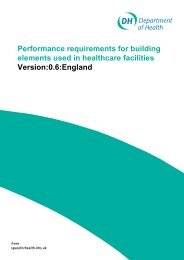Early Life Nutrition and Lifelong Health - Derbyshire Local Medical ...
Early Life Nutrition and Lifelong Health - Derbyshire Local Medical ...
Early Life Nutrition and Lifelong Health - Derbyshire Local Medical ...
You also want an ePaper? Increase the reach of your titles
YUMPU automatically turns print PDFs into web optimized ePapers that Google loves.
BMA Board of Sciencemicronutrient supplementation trials. 9 Birth weight is a crude measure of fetal development, <strong>and</strong>may under-estimate effects on specific fetal tissues <strong>and</strong> organs. The Gambia high-energy biscuittrial, <strong>and</strong> a recent trial of multiple micronutrient supplementation in Indonesian mothers, reportedreduced infant mortality 242 but opposing results were found in two earlier trials in Nepal. 243 Moremeasurements of functional outcomes such as growth <strong>and</strong> risk factors for later disease arerequired in such trials.Developing country perspectiveThe BMA report Improving the health of the world’s poor (2007), highlights the persistingproblems of poverty <strong>and</strong> undernutrition in many developing countries <strong>and</strong> its effects onmaternal, fetal <strong>and</strong> infant health. Young women often have little control over family finances<strong>and</strong> food purchases, <strong>and</strong> come last in the family hierarchy in terms of access to food. Babiesborn to undernourished women are more likely to be born pre-term <strong>and</strong>/or be growthrestricted. Sub-optimal breastfeeding practices <strong>and</strong> poor-quality complementary feedingfrequently follow <strong>and</strong> set the infant on course to becoming a stunted child, with impairedphysical development <strong>and</strong> cognitive ability. An especially adverse situation, in terms of adulthealth, comes from poor nutrition in early life followed by obesity in later life. Thiscombination is increasingly common in developing countries <strong>and</strong> carries a high risk of adulthypertension, diabetes <strong>and</strong> cardiovascular disease. 19 Of the eight United Nations MillenniumDevelopment Goals, Numbers 1 (Eradicate extreme poverty <strong>and</strong> hunger), 4 (Reduce childmortality) <strong>and</strong> 5 (Improve maternal health) directly relate to the issues discussed in this report.In addition Number 2 (Achieve universal primary education), <strong>and</strong> 3 (promote gender equality<strong>and</strong> empower women) are related goals. While progress towards these is being made, it islikely that many of them will not be met by the target year of 2015.Guidelines for improving the diets of young women in the UKThere have been consistent dietary messages to adults over many years to encourage consumptionof fruit <strong>and</strong> vegetables, starchy foods <strong>and</strong> oily fish, <strong>and</strong> to limit consumption of dietary fat, salt <strong>and</strong>added sugar. The recommendations for a ‘healthy’ diet were based on evidence of the role of dietin the aetiology of cardiovascular disease <strong>and</strong> some cancers, 244, 245 <strong>and</strong> recently specific advice onoily fish consumption, salt <strong>and</strong> vitamin D intakes has been updated. 246-248 Dietary guidelines arecomparable across the developed world. Current UK advice is depicted in the Eatwell platemodel. 249 While this advice may be widely understood, the most recent National Diet <strong>and</strong> <strong>Nutrition</strong>Survey (NDNS) shows that many adults do not comply with these dietary guidelines, <strong>and</strong> that the2, 250, 251diets of young adults may be a particular cause for concern (see Box 10).<strong>Early</strong> life nutrition <strong>and</strong> lifelong health 51



